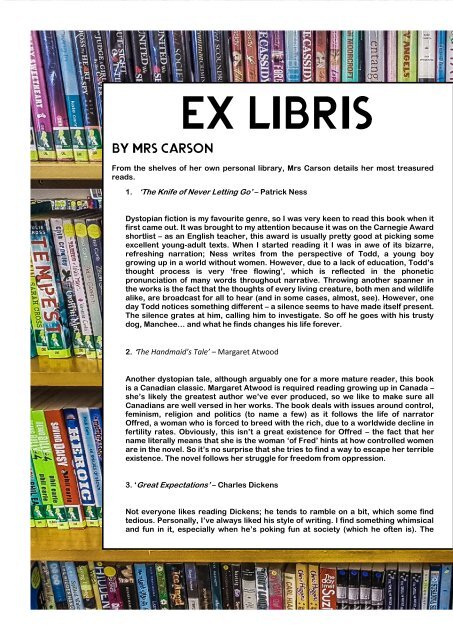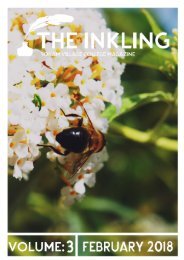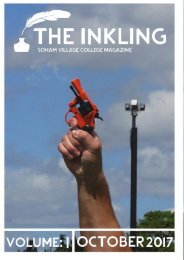The Inkling Volume 2
Create successful ePaper yourself
Turn your PDF publications into a flip-book with our unique Google optimized e-Paper software.
By Mrs Carson<br />
EX Libris<br />
From the shelves of her own personal library, Mrs Carson details her most treasured<br />
reads.<br />
1. ‘<strong>The</strong> Knife of Never Letting Go’ – Patrick Ness<br />
Dystopian fiction is my favourite genre, so I was very keen to read this book when it<br />
first came out. It was brought to my attention because it was on the Carnegie Award<br />
shortlist – as an English teacher, this award is usually pretty good at picking some<br />
excellent young-adult texts. When I started reading it I was in awe of its bizarre,<br />
refreshing narration; Ness writes from the perspective of Todd, a young boy<br />
growing up in a world without women. However, due to a lack of education, Todd’s<br />
thought process is very ‘free flowing’, which is reflected in the phonetic<br />
pronunciation of many words throughout narrative. Throwing another spanner in<br />
the works is the fact that the thoughts of every living creature, both men and wildlife<br />
alike, are broadcast for all to hear (and in some cases, almost, see). However, one<br />
day Todd notices something different – a silence seems to have made itself present.<br />
<strong>The</strong> silence grates at him, calling him to investigate. So off he goes with his trusty<br />
dog, Manchee… and what he finds changes his life forever.<br />
2. ‘<strong>The</strong> Handmaid’s Tale’ – Margaret Atwood<br />
Another dystopian tale, although arguably one for a more mature reader, this book<br />
is a Canadian classic. Margaret Atwood is required reading growing up in Canada –<br />
she’s likely the greatest author we’ve ever produced, so we like to make sure all<br />
Canadians are well versed in her works. <strong>The</strong> book deals with issues around control,<br />
feminism, religion and politics (to name a few) as it follows the life of narrator<br />
Offred, a woman who is forced to breed with the rich, due to a worldwide decline in<br />
fertility rates. Obviously, this isn’t a great existence for Offred – the fact that her<br />
name literally means that she is the woman ‘of Fred’ hints at how controlled women<br />
are in the novel. So it’s no surprise that she tries to find a way to escape her terrible<br />
existence. <strong>The</strong> novel follows her struggle for freedom from oppression.<br />
3. ‘Great Expectations’ – Charles Dickens<br />
Not everyone likes reading Dickens; he tends to ramble on a bit, which some find<br />
tedious. Personally, I’ve always liked his style of writing. I find something whimsical<br />
and fun in it, especially when he’s poking fun at society (which he often is). <strong>The</strong>




